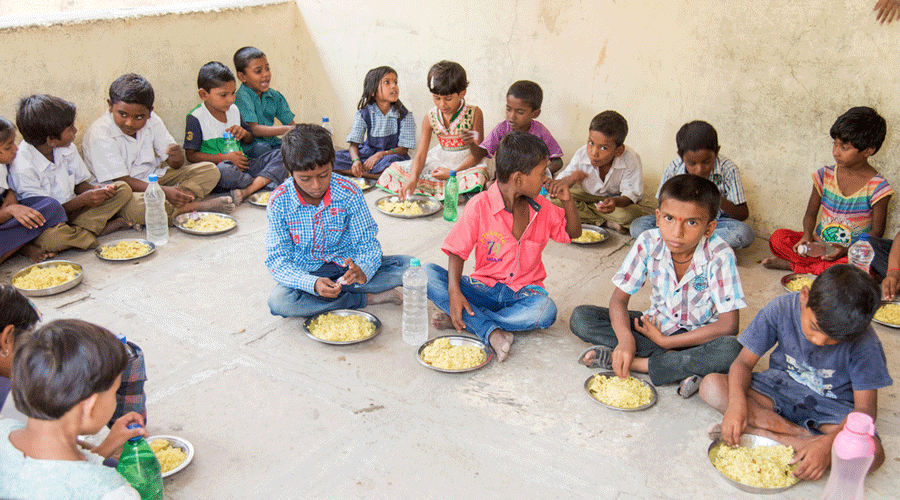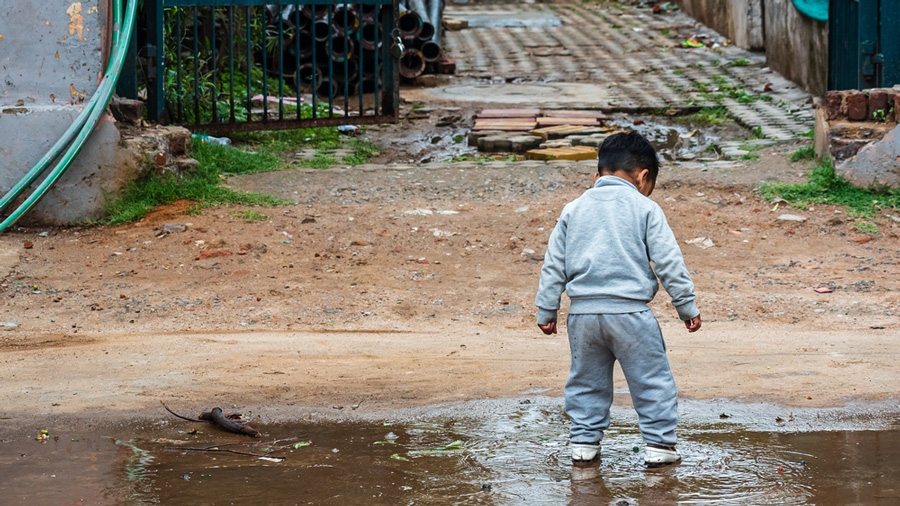Every time Khulana Pradhan, 37, goes to her village bank to withdraw the money transferred to her account as nutritional allowance for her 10-year-old son Ayush under the school midday meal scheme, she returns empty-handed.
The resident of Balihaat village in Odisha’s Puri district risks her health standing in the queue amid a pandemic only to get the stock reply: “There is no money in your account.”
“The schoolteacher tells me the money has been transferred to my account. When I ask the bank, there’s no money. The bank says that whatever money arrived had been auto-debited towards my arrears under the Atal Pension Yojana (APY),” Khulana said.
The around 10 crore children enrolled in Class I to VIII at government and government-aided schools are entitled to a cooked midday meal at school every day except holidays. With the schools closed because of Covid, the Centre had in March last year advised the states to use the central funds under the scheme to distribute cooked meals among the children’s families or directly transfer the money to them.
Odisha has been providing the families with rice and wheat while transferring to their bank account money towards oil and other ingredients at about Rs 5 per school day, which comes to not much over Rs 100 in an average month. The money is sent through the schools every three months.
Khulana said she had to pay Rs 240 a month for the APY, a contributory pension scheme run by the central government. Two years ago, the local self-help group (SHG) had encouraged her to become a subscriber. Banks ask the SHGs to enrol their members for the APY and the Pradhan Mantri Shram Yogi Manndhan, another contributory pension scheme, Khulana said.
“I never realised it would be so difficult to pay the instalments. For the last one year, there has been no work for my husband, a labourer. I have been unable to pay the dues,” the homemaker said.
Prafulla Kumar Pradhan, a teacher at the Balihaat primary school, said the school had 40 students last year and that the nutrition allowance was being transferred to the bank accounts of all their parents.
“But because of auto debit towards arrears, six parents could not draw their money,” Pradhan said.
Sameet Panda, co-convener of the civil society group Right To Food Campaign’s Odisha chapter, said “hundreds of parents” had complained that their children’s nutrition allowance was getting eaten up by pending bank payments or fines for low balance.
He said the trend was being seen in other states too since parents who send their children to government schools are poor and tend to default on bank payments or fail to maintain the minimum balance in their accounts.
“Besides, the parents who are getting the money are unlikely to spend it all on their children’s nutrition. The money is spent as part of the family food basket, so the overall nutrition level of the children is dropping,” Panda said.
He said this would worsen malnutrition among the children.
According to the results of Phase 1 of the National Family Health Survey-5, several states have witnessed an increase in the proportion of underweight children and in childhood stunting between 2015-16 and 2019-20.
The proportion of underweight children increased in seven of the 10 states for which data has been released, while stunting increased in six states.Under the midday meal scheme, schools usually provide cooked rice or chapattis with dal and vegetables. Some states occasionally provide eggs (Odisha), fish (Bengal) or milk (Madhya Pradesh) in addition.
On Friday, the Union education ministry advised the states to send the midday meal assistance to the eligible children entirely in the form of direct benefit transfer. If Odisha chooses to follow this, the dry rations would stop and the entire aid will come in the form of money transfer — to be eaten up by the APY payments in Khulana’s case. It could not be immediately ascertained whether Odisha intended to switch entirely to direct benefit transfer.
Economist Jean Dreze, a visiting professor with Ranchi University, said he had come across instances of money deposited as a social benefit —such as pensions and NREGA wages — getting auto-debited without the customer being informed.
“In the case of Odisha, it may be better to give the schoolchildren weekly or monthly take-home rations, including eggs. This will also help ensure that the children keep a connection with their school,” he said.
Dreze disapproved of the Centre’s advisory to provide the midday meal assistance entirely in the form of money transfer.
“I don’t think the central government should impose a uniform policy on this. It should provide the midday meal funds to the states and let them decide how to use them according to their circumstances and capabilities for the duration of the Covid crisis,” he said.
An academic who did not want to be quoted said the Centre should ask the banks not to divert the nutrition allowance for children towards the payment of dues.
An email sent to the Union education ministry seeking its views on the problem of auto debits gobbling up the nutritional allowance for many children had brought no answer till Friday night.












